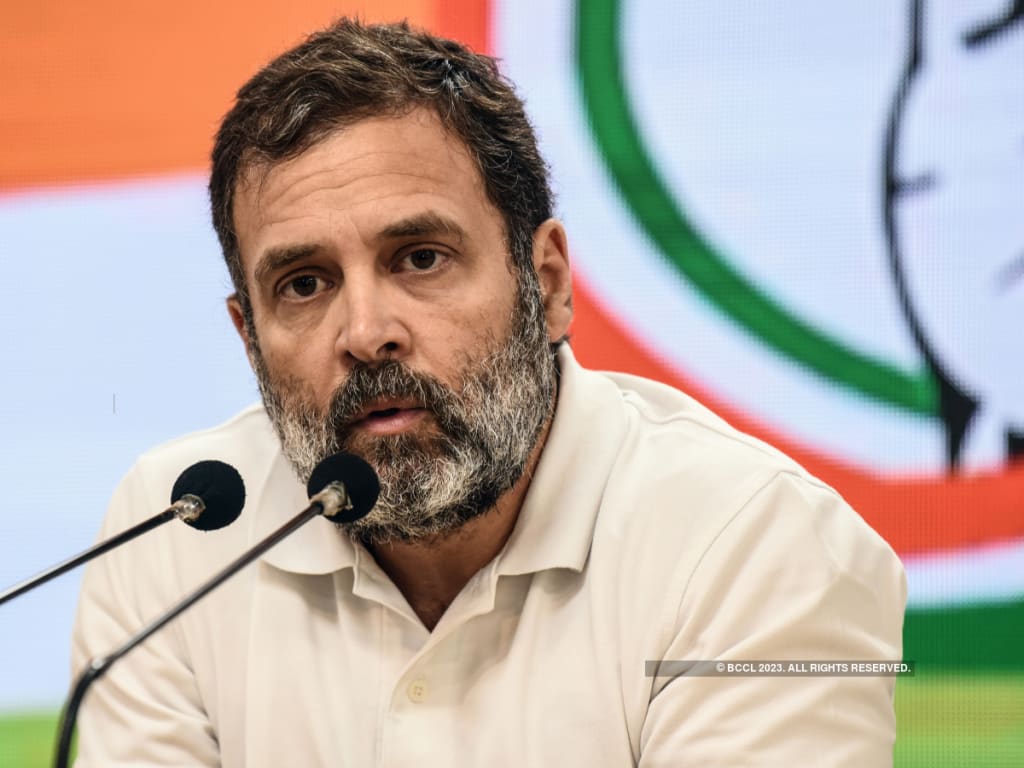
Congress leader Rahul Gandhi has declared that he will not apologise, stating that he is a Gandhi and not Veer Savarkar. Gandhi was speaking at a press conference following his expulsion from Parliament for his conviction in a defamation case. The former Wayanad MP expressed his gratitude for the support he had received from the opposition, saying that his disqualification would be a weapon against the Modi-led government.
Gandhi went on to say that his disqualification was directly related to the Prime Minister, who did not want him to speak about his relationship with the Adani Group. He claimed that Gautam Adani was corrupt and questioned why Modi was saving him from investigation. He pledged to keep asking questions about the alleged relationship, and even if he was disqualified for life, he would continue raising questions and fighting for the people.
"My voice is being suppressed," Rahul Gandhi said, claiming that he had spoken to the Speaker about false accusations made by four ministers but was not allowed to speak. Gandhi was disqualified as a member of the Lok Sabha a day after his conviction in the 2019 "Modi surname" defamation case. He represents the Wayanad parliamentary constituency of Kerala and was disqualified under provisions of Article 102 (1) (e) of the Constitution of India read with Section 8 of Representation of the People's Act.
On Thursday, Gandhi was sentenced to two years in jail by a Surat court in the case filed on a complaint by BJP MLA Purnesh Modi. Despite his conviction and disqualification, Gandhi said he would continue to fight for the country, saying that his disqualification was the best gift he could have received.
Gandhi's comments about his disqualification being related to his criticism of the Adani Group are part of a broader debate in India about the relationship between government and big business. The Adani Group is one of the largest business conglomerates in India, with interests in a range of sectors, including ports, airports, and renewable energy. The group has been accused of receiving favorable treatment from the government, and of benefiting from policies that favor large corporations over small businesses and farmers.
Gandhi's comments about his disqualification being related to the Prime Minister's fear of his next speech in Parliament suggest that he believes the government is using its power to silence its critics. This view is shared by many opposition leaders and civil society activists, who argue that the government's actions are undermining India's democratic institutions and eroding the country's democratic values.
The decision to disqualify Gandhi has also raised questions about the independence of India's judiciary. Some critics have accused the government of using the courts to silence its political opponents, and of manipulating the judicial process to achieve its political objectives. This perception has been fueled by a series of high-profile cases, including the 2018 arrest of five activists accused of having links to Maoist groups, and the 2020 arrest of student leader Umar Khalid on charges of sedition.
Despite these concerns, the government has defended its actions, arguing that it is committed to upholding the rule of law and protecting India's national security interests. The government has also accused its critics of spreading false information and working against the country's interests.
The ongoing debate about the relationship between government and big business, the independence of the judiciary, and the role of opposition leaders in India's democracy reflects the challenges facing the country as it seeks to balance economic growth and political stability. While many Indians remain optimistic about the future of their country, others are concerned that the government's actions are undermining the country's democratic values and eroding its international reputation.
That concludes the rewrite of the article. If you have any further questions or requests, feel free to let me know.






Comments (1)
😳